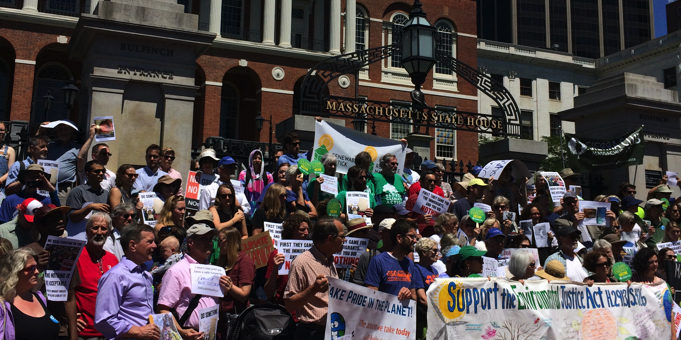Massachusetts New Climate Law Takes Effect Today
State’s energy policies must now weigh equity, climate concerns and community safety alongside cost and energy needs
June 25, 2021 – Massachusetts’ breakthrough climate law takes legal effect today, 90 days after it was signed by Gov. Charlie Baker. Most notably, effective today, the scope and mission of one state agency, the Department of Public Utilities (DPU), has changed dramatically. The DPU can no longer make decisions strictly based on the criteria of system reliability and affordability, instead it must factor in the effects of our energy system on residents health and safety and the climate, as well as cumulative impacts for environmental justice communities.
The bill rode a rollercoaster on the way to passage in late 2020 and early 2021. Governor Charlie Baker vetoed a version of the legislation that came to his desk days before the end of the 2019-2020 legislative session. When it reached his desk again in January, Governor Baker sent watered down amendments back to the legislature. House and Senate leaders responded to pressure from their constituents and overwhelmingly rejected efforts to weaken key parts of the legislation. The Governor finally capitulated and signed the bill into law in March 2021.
The Department of Public Utilities must align its policymaking with an ambitious new mission. Under the Next Generation Roadmap, the DPU must give equal weight to six factors as it decides electric power and natural gas rates, reviews contracts with electric and gas companies, and makes policy. System reliability and affordability, the DPU’s two long standing priorities, will remain crucial, but starting today the DPU must also consider four new criteria — safety, system security (from both cyberattacks and physical sabotage), equity, and reductions in climate pollution (GHG).
“This bill takes an important step by putting equity and climate explicitly in the mission of our utility oversight. It’s been long overdue.” said Lee Matsueda of Community Labor United, “Now our energy policy will have more clear guidance to better serve Environmental Justice communities, and confront disproportionate impact and unequal treatment.”
Also starting today is the requirement that all parties – the state agencies, the utilities, the program administrators – involved in running Mass Save must factor the “social value of greenhouse gas emission reductions” into the design, evaluation, and approval of program service. Essentially, until now, the benefits of not burning dirty fuel for health and climate justice have been missing from the cost-benefit analysis.
“With the social value and benefits of equitable energy efficiency being finally added to the equation, we will see deeper investments in these critical programs.” said Andrea Nyamekye of Neighbor to Neighbor, “Cleaner air, lower heating and cooling bills, and lower asthma rates in historically impacted communities.”
This new requirement begins little more than a month after the Energy Efficiency Advisory Committee shared a Draft 2022-2024 Energy Efficiency Plan. During the last public comment session, advocates highlighted another new statutory requirement, effective today, to align the plan’s goals and benchmarks with the new emissions targets that will be established on July 15 by the Office of Energy and Environmental Affairs.
The Green Justice Coalition has worked for years to increase access to energy efficiency programs in language isolated and low-income communities. “Residents in our state are struggling with high utility bills and economic hardship after COVID-19; with the rising temperatures every year, we cannot let our communities suffer any longer. We call on the Baker Administration to address the barriers that are preventing participation by members of EJ communities and reject any 3-year plan that doesn’t center the needs of these communities.” said Paulina Casasola, Climate Justice Organizer for Clean Water Action.
“Governor Baker had succumbed to the interests of real estate lobby groups and attempted to water down key provisions in the bill, targeting the net zero stretch provisions,” Sarah Dooling of the Massachusetts Climate Action Network said. “But advocates got this bill over the finish line by demanding buildings be part of the climate solution, and legislators listened. Building code is now valued as a core part of the climate movement. The bill also adds three new seats to the Board of Building Regulations and Standards — with expertise in commercial and residential building energy efficiency, and advanced building technology. The BBRS is now in a position to work effectively with the Department of Energy Resources on developing a true net zero stretch code guided by community input.”


Recently on Twitter